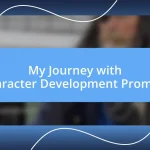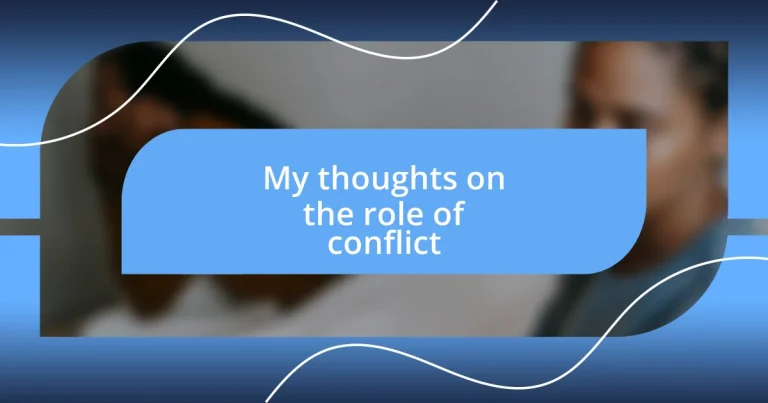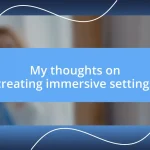Key takeaways:
- Conflict, though uncomfortable, can foster growth, innovation, and deeper relationships when approached with open dialogue and vulnerability.
- Recognizing different types of conflict—interpersonal, intrapersonal, and organizational—enables better navigation of situations and enhances collaboration.
- Effective conflict resolution strategies, such as active listening, collaboration, and mediation, can transform disputes into constructive discussions and strengthen connections.
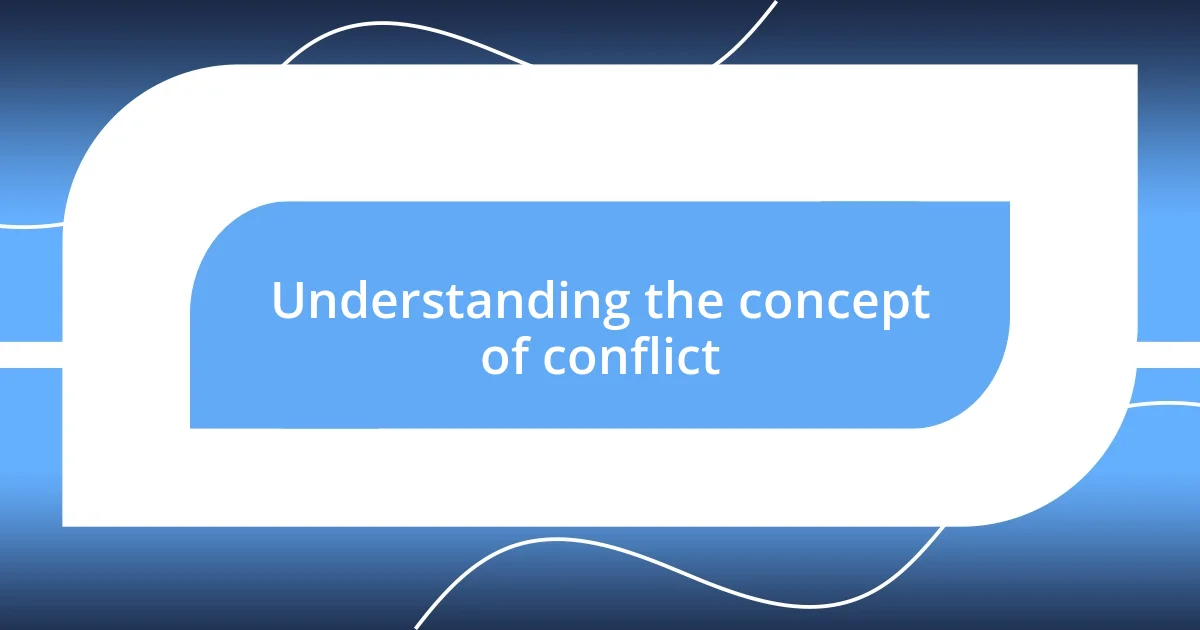
Understanding the concept of conflict
Conflict can often feel like a buzzword, but at its core, it’s simply a disagreement or clash of interests. I remember a time in a group project where differing opinions led to tension. Instead of shying away, we had to confront our differences, and that’s when I realized how vital open dialogue is in resolving conflicts.
As I reflect on the concept of conflict, I can’t help but think about its dual nature. On one hand, it can be uncomfortable and distressing; on the other, it can spark growth and innovation. Have you ever noticed how some of the best ideas come from heated debates? I know I have, especially when a passionate discussion forces us to rethink our positions.
Understanding conflict also means acknowledging its inevitability in relationships, whether personal or professional. The most meaningful connections thrive on honesty, and sometimes that entails navigating awkward conversations. I find it empowering when I embrace conflict rather than avoid it; it shifts the dynamic and can deepen relationships. What if we viewed conflicts not as roadblocks, but as stepping stones towards a stronger bond? Wouldn’t that change our approach to disagreement?
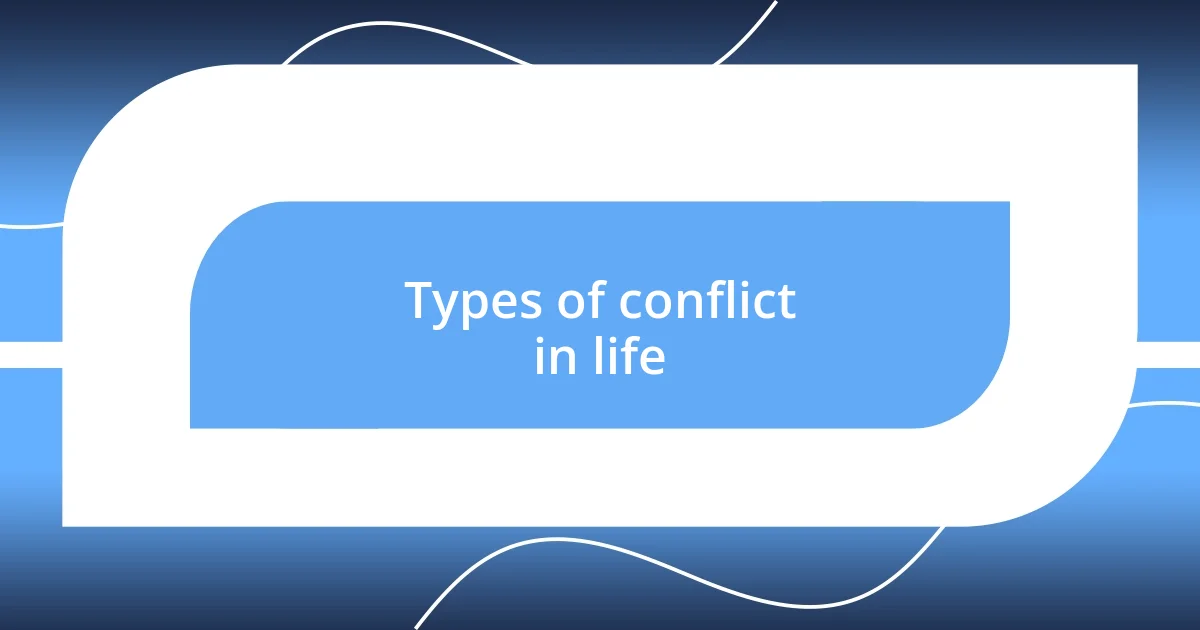
Types of conflict in life
Conflict appears in various forms throughout our lives, and recognizing these types can be quite enlightening. For instance, interpersonal conflict often arises between individuals, driven by differences in personality or perspective. I vividly recall a tense moment with a close friend where our priorities clashed while planning a joint vacation. Through that experience, I learned that discussing our different viewpoints opened the door to creative solutions and a more fulfilling trip.
Then there’s intrapersonal conflict, which occurs within ourselves. It’s that nagging feeling when our desires conflict with our values. For example, I once grappled with accepting a promotion that required long hours, conflicting with my family time. Reflecting on that decision was a pivotal moment for me—balancing ambition with what truly mattered in life made me reassess my priorities.
Lastly, organizational conflict can emerge within teams or larger groups, often stemming from varying goals or competition for resources. During a project at work, our team faced struggles when departmental objectives didn’t align. Working through that conflict ultimately taught us all about the importance of collaboration and compromise in achieving a common goal. Understanding these types of conflict helps us navigate the complexities of human interaction, ensuring we emerge stronger and more grounded.
| Type of Conflict | Description |
|---|---|
| Interpersonal Conflict | Disagreements between individuals, often due to differences in personality or perspective. |
| Intrapersonal Conflict | Internal struggles within an individual that arise when desires clash with personal values. |
| Organizational Conflict | Conflicts that occur within teams or organizations due to differing goals or competition for resources. |
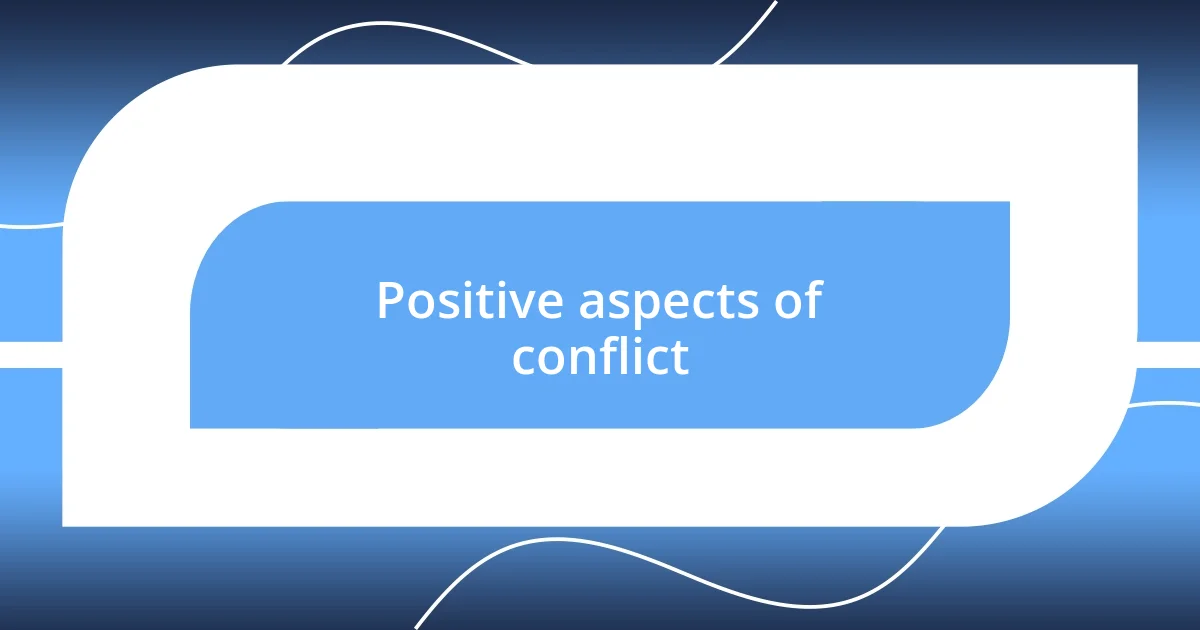
Positive aspects of conflict
Conflict isn’t always a negative experience; in fact, it can lead to some surprising positive outcomes. I recall a time when a disagreement with a colleague turned into a brainstorming session that ultimately refined our project. We learned to challenge each other’s ideas, and that friction ignited a stream of creative solutions we hadn’t considered before. This type of productive conflict can stimulate innovation and boost team dynamics.
Here are some positive aspects of conflict to consider:
- Encourages Growth: It pushes individuals beyond their comfort zones.
- Fosters Creativity: Disagreements can lead to novel ideas and solutions.
- Builds Trust: Resolving conflicts collaboratively can strengthen relationships.
- Improves Communication: Addressing conflicts enhances understanding and transparency.
- Drives Change: Conflict often highlights areas that need improvement or reform.
In another instance, I faced a particularly challenging situation in a community volunteer group where differing opinions over project priorities sparked tension. Instead of letting it simmer, we decided to hold a candid discussion. Sharing our perspectives not only clarified our goals but also brought us closer as a team. I realized that navigating conflict openly creates a space for empathy and better aligns our vision, ultimately transforming dissent into a catalyst for unity.
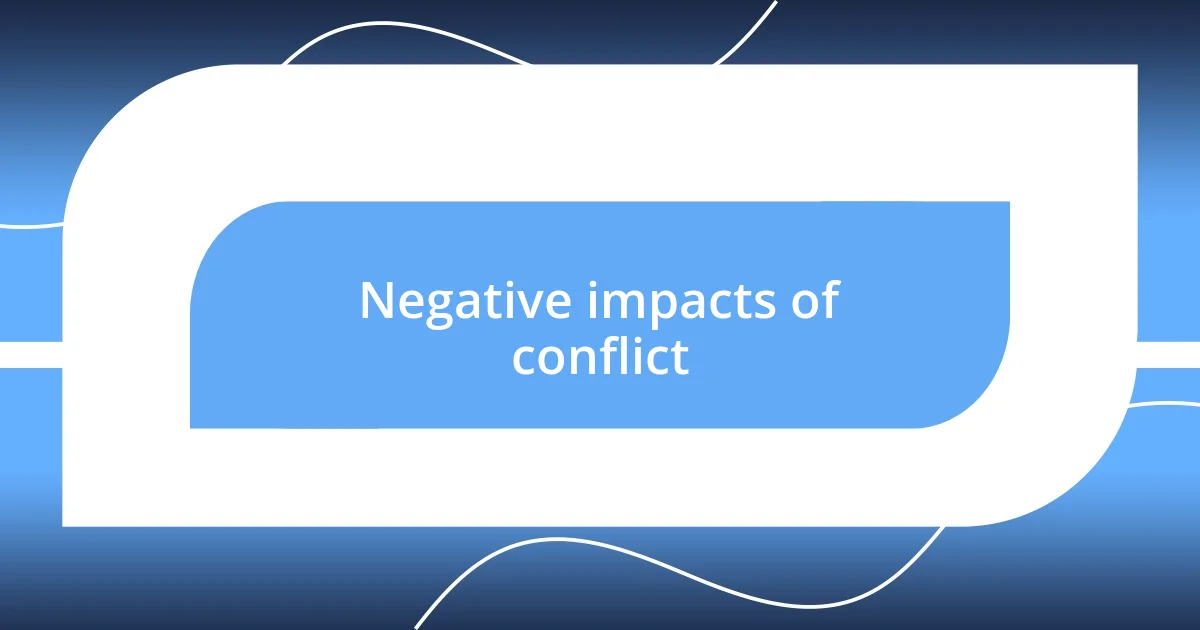
Negative impacts of conflict
The negative impacts of conflict can often overshadow any potential benefits. For instance, I once witnessed a severe fallout between two colleagues where the disagreement quickly escalated. Instead of focusing on their project, they became consumed by resentment, which not only drained their energy but also impacted the entire team’s morale. It was disheartening to see how unresolved conflict disrupted teamwork and collaboration.
In another experience, I faced a rift within my family that stemmed from a miscommunication. What began as a small disagreement about holiday plans snowballed into weeks of silence and tension. I realized how deeply conflict can harm personal relationships, leaving emotional scars that take time to heal. It’s a stark reminder—how many times have we let pride prevent reconciliation?
Moreover, in professional settings, conflict can lead to high turnover rates. I recall a project where ongoing disputes contributed to talented team members leaving. Their departure not only affected morale but also hindered progress on critical tasks. This experience highlighted how unchecked conflict can result in the loss of valuable resources, driving home the point that addressing disagreements from the outset is essential for maintaining a healthy work environment. Do you think the cost of conflict is often underestimated in our lives?
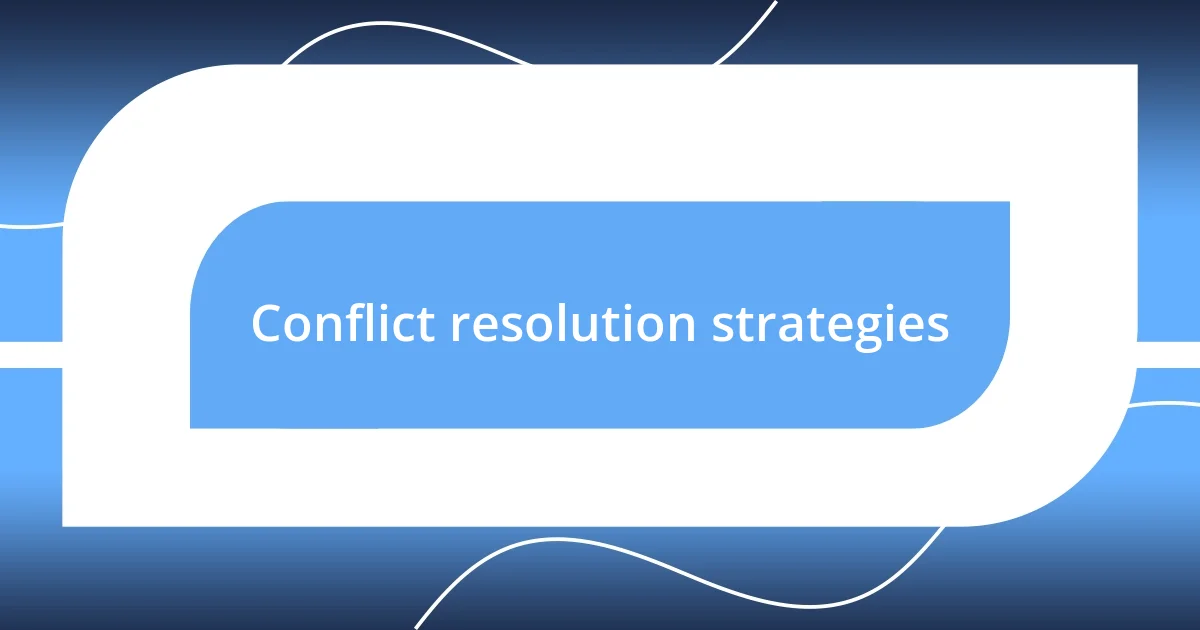
Conflict resolution strategies
Conflict resolution strategies play a crucial role in turning potentially negative experiences into constructive dialogues. One approach that I’ve found particularly effective is active listening. When I’ve had conflicts with friends, simply allowing them to express their feelings without interruption often diffuses tension significantly. It’s incredible how much clarity can emerge when both parties feel truly heard. Have you ever noticed how listening can calm a heated situation?
Another method that stands out to me is collaboration, where all involved parties work together to find a win-win solution. During a challenging project at work, my team faced opposition over resource allocation. Instead of letting frustration brew, we convened to brainstorm alternatives that met everyone’s needs. This collaborative spirit not only resolved the conflict but also fostered a sense of ownership among us. Isn’t it fascinating how conflict can be a catalyst for teamwork when approached with the right mindset?
Lastly, I’ve often turned to mediation, especially in more complex disputes where emotions run high. In a family disagreement about caregiving responsibilities, having a neutral person facilitate the discussion allowed us all to express our views without escalating tensions. This third-party perspective often helps clarify misunderstandings that can fuel conflict further. Have you ever decided to bring in someone else to help resolve a dispute? It can be a game-changer.
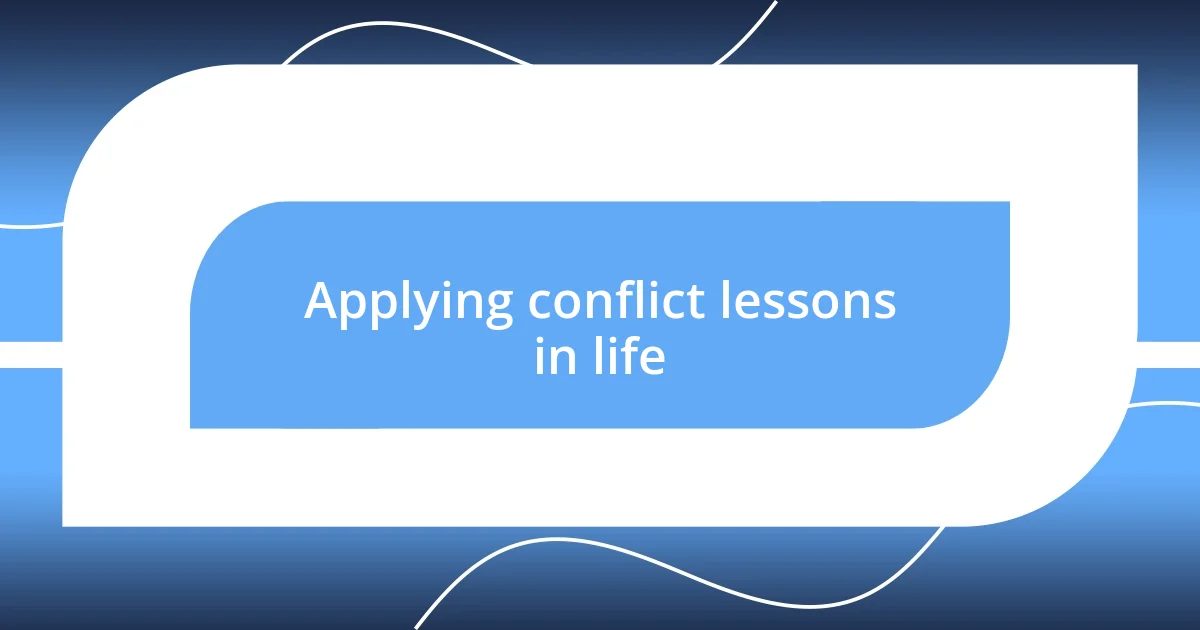
Applying conflict lessons in life
Experiencing conflict has taught me that the lessons we glean from it can significantly impact our lives. For instance, I remember a time when I was at odds with a very close friend. Instead of letting the disagreement fester, we decided to confront it head-on. By sharing our perspectives openly, we didn’t just resolve the issue; we deepened our friendship. Have you ever felt that sense of connection grow stronger after facing a challenge together?
Applying conflict lessons isn’t just about resolving disagreements; it’s also about self-reflection. I’ve noticed that conflicts often reveal something about myself that I may not realize in quieter times. A recent dispute at work pushed me to examine my communication style and recognize how it can sometimes come across as harsh. This awareness prompted me to adapt my approach, paving the way for more constructive interactions. Isn’t it interesting how conflict can serve as a mirror, reflecting our strengths and areas for growth?
Additionally, I find that embracing vulnerability during conflicts can be powerful. In one situation with my team, instead of maintaining my usual guard, I admitted my frustrations openly, which sparked a candid dialogue among us. This willingness to be vulnerable led to a surprising shift in our dynamics, where everyone felt safe to share their concerns. Have you ever let your guard down in a tough moment? It can transform the nature of a conflict into an opportunity for connection.










